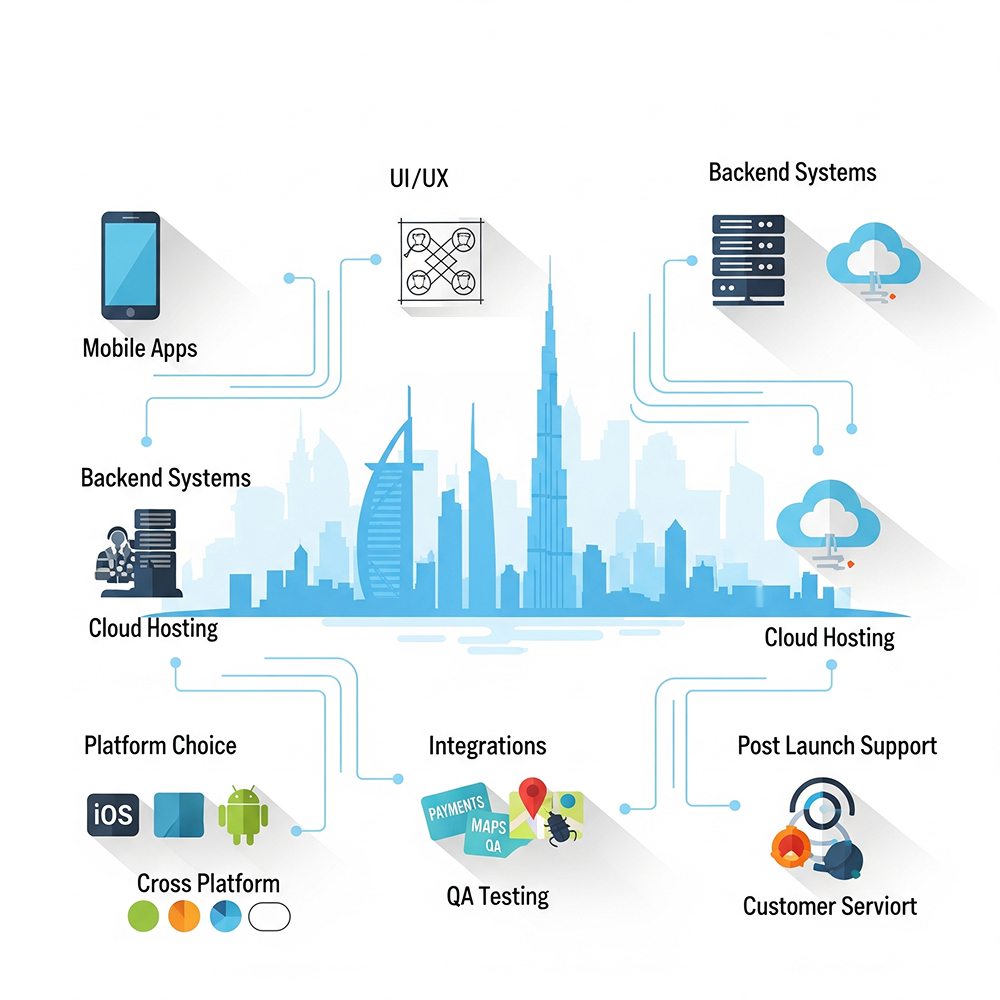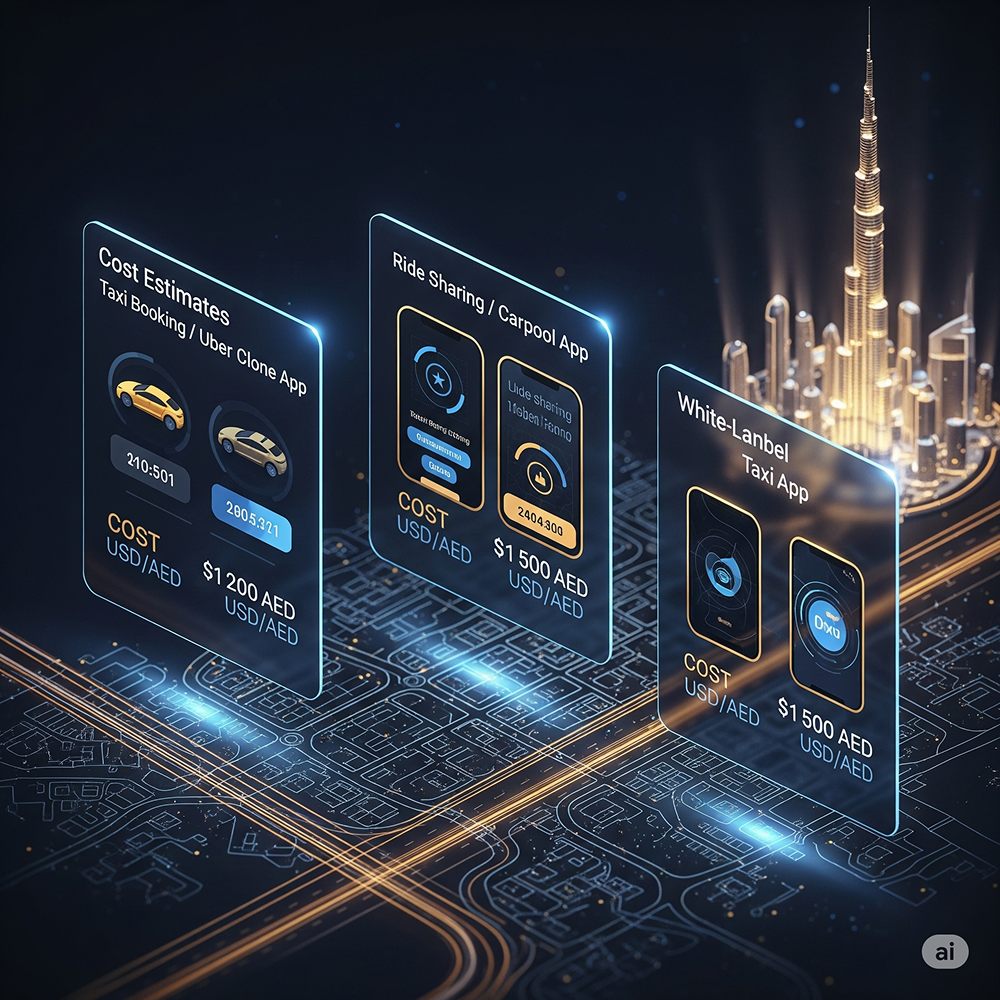How Much Does Software Development Cost in Dubai (2025)? | Taxi App, Ride Sharing, and White-Label Solutions

Dubai's relentless pursuit of innovation and its booming economy have firmly established it as a global hub for technological advancement. In this dynamic landscape, the demand for sophisticated software solutions is at an all-time high, particularly in the transportation sector. From a cutting-edge taxi booking app development company creating seamless urban mobility experiences to businesses seeking robust ride-hailing apps and ride sharing apps, are the digital transformation is palpable. But for any aspiring entrepreneur or established enterprise looking to build a taxi app or an uber clone app, the inevitable and crucial question arises: "How much will this cost in Dubai in 2025?"
Understanding software development costs in Dubai, especially for on-demand mobility solutions, is a nuanced exercise. The price tag isn't a fixed figure but rather a mosaic of interconnected factors, each playing a significant role in the overall investment. This comprehensive guide will delve into these elements, providing realistic cost estimates for developing a taxi booking app, ride sharing app, and white-label taxi app development solutions in Dubai in the year 2025.
The Ecosystem of Software Development Costs in Dubai

Before diving into specific app types, it's essential to grasp the fundamental drivers of software development costs in Dubai:
- Project Complexity and Feature Set:This is the most dominant factor. A bare-bones Minimum Viable Product (MVP) with core functionalities will always be significantly less expensive than a feature-rich, enterprise-grade application. Every additional feature – from advanced navigation and real-time analytics to in-app chat, multiple payment gateways, and AI-driven matching algorithms – adds to the development hours and, consequently, the cost. For taxi application development, features like surge pricing, ride scheduling, and driver performance dashboards can escalate complexity.
-
Platform Choice (Native vs. Cross-Platform):
- Native Development (iOS and Android): Building separate applications specifically for iOS (Swift/Kotlin) and Android (Kotlin/Java) offers the best performance, user experience, and access to device-specific features. However, it means two distinct codebases, leading to higher development costs and longer timelines.
- Cross-Platform Development (Flutter, React Native): Frameworks like Flutter and React Native allow developers to write a single codebase that runs on both iOS and Android. This can reduce development time and cost by 25-40%, making them a popular choice for businesses prioritizing faster market entry and budget efficiency for solutions like a carpool app or a standard taxi app development. While performance is generally excellent, certain complex, device-specific functionalities might still require native modules.
- UI/UX Design Complexity: The visual appeal and user-friendliness of your app are paramount for user adoption and retention. A highly customized, intuitive, and engaging User Interface (UI) and User Experience (UX) design, often involving intricate animations and bespoke branding, requires more design hours and specialized expertise, thus contributing to the overall cost. Investing in exceptional UI/UX for your taxi booking mobile app development pays dividends in user satisfaction.
- Technology Stack: The choice of programming languages, frameworks, databases (e.g., MongoDB, PostgreSQL), and cloud services (e.g., AWS, Azure, Google Cloud) influences both development effort and ongoing infrastructure costs. Leveraging modern, scalable technologies is crucial for long-term success. The increasing integration of AI/ML, blockchain, and IoT in 2025 further adds to the complexity and potential cost of the tech stack for sophisticated ride-hailing apps.
-
Development Team Location and Expertise: Dubai-based development agencies or individual freelancers generally command higher hourly rates compared to those in regions like India or Eastern Europe, reflecting the higher cost of living and market dynamics in the UAE.
- Average Hourly Rates in Dubai (2025): Expect rates for skilled software developers in Dubai to range from $50 to $120+ USD per hour. This can vary based on the firm's reputation, developer's experience, and the specific technology stack. While outsourcing to regions with lower rates can save costs, it's crucial to ensure quality, communication, and cultural alignment.
-
Third-Party Integrations:Most modern apps rely on integrating with external services, such as:
- Payment Gateways: Stripe, PayPal, local payment solutions.
- Mapping Services:Google Maps API, Mapbox for taxi app development services.
- SMS/Email Gateways: For notifications and verification.
- Social Media APIs: For login and sharing
- Local Regulatory APIs: Like the RTA (Roads and Transport Authority) APIs for taxi services in Dubai, which are essential for compliance but add integration complexity. Each integration adds to development time and may involve recurring licensing fees.
- Backend Infrastructure and Scalability:A robust and scalable backend is the backbone of any successful on-demand service. This includes server setup, database management, API development, and ensuring the infrastructure can handle high user traffic and data loads, especially for ride-hailing apps that experience peak demands.
- Testing and Quality Assurance (QA): Thorough testing across various devices, operating systems, and network conditions is non-negotiable to ensure a bug-free and smooth user experience. This phase includes functional testing, performance testing, security testing, and user acceptance testing, all contributing to the final cost.
- Maintenance and Post-Launch Support: An app isn't a one-time project. Ongoing maintenance, bug fixes, security updates, performance monitoring, feature enhancements, and server costs are recurring expenses. Typically, these can amount to 15-20% of the initial development cost annually.
Cost Estimates for Popular On-Demand Mobility Solutions in Dubai (2025)

Let's break down the estimated costs for specific types of mobility apps:
1. Taxi Booking App Development / Uber Clone App
This category includes solutions designed to replicate the core functionalities of popular platforms like Uber, Careem, or Hala. A typical taxi application development project involves three main components: a passenger app, a driver app, and an admin panel.
-
MVP (Minimum Viable Product):A basic taxi booking app MVP would include essential features like user registration, ride booking, real-time GPS tracking, fare estimation, basic payment integration (cash/card), and driver/rider profiles.
- Estimated Cost in Dubai (2025):$40,000 - $120,000 USD (AED 147,000 - AED 440,000).
- Development Time:3-6 months.
-
Full-Featured Taxi App / Advanced Uber Clone App:This version expands significantly on the MVP, incorporating features such as:
- Passenger App:Multiple vehicle types (economy, luxury, SUV), ride scheduling, in-app chat/call, split payments, promo codes, ride history, favorite locations, SOS button, dynamic pricing based on demand, loyalty programs.
- Driver App:Driver verification, earnings dashboard, trip history, navigation optimization, heatmaps for high-demand areas, driver support.
- Admin Panel:Comprehensive user and driver management, fleet management, real-time ride monitoring, fare management, surge pricing control, analytics and reporting, customer support management, dispute resolution, push notification management.
- Integrations:Advanced payment gateways, RTA API for compliance (crucial in Dubai), third-party analytics, CRM integration.
- Estimated Cost in Dubai (2025): $150,000 - $350,000 USD (AED 550,000 - AED 1,285,000)+.
- Development Time: 7-12+ months.
- Key Cost Drivers: Real-time data processing, complex algorithms for driver matching and route optimization, advanced security measures, and extensive UI/UX customization.
-
MVP for a Carpool App: Basic user profiles, ride posting (for drivers), ride searching (for passengers), in-app messaging, basic route matching, and payment collection.
- Estimated Cost in Dubai (2025): $50,000 - $150,000 USD (AED 183,500 - AED 550,000).
- Development Time:4-8 months.
-
MFull-Featured Ride Sharing App: Includes advanced matching algorithms (AI-powered for optimal routing and passenger combinations), dynamic pricing based on distance/occupancy, rating and review systems, user verification (ID/license checks), detailed user profiles, group chat options, scheduled rides, and potentially subscription models.
- Estimated Cost in Dubai (2025): $180,000 - $400,000 USD (AED 660,000 - AED 1,470,000)+.
- Development Time: 8-15+ months.
- Key Cost Drivers: Sophisticated matching algorithms, robust backend to handle complex routing, and potentially higher regulatory compliance for shared mobility services.
-
Basic White-Label Solution with Branding:This involves licensing a pre-existing taxi app solution and customizing it with your branding (logo, colors, basic design elements). The core features are typically fixed.
- Estimated Cost in Dubai (2025): $20,000 - $60,000 USD (AED 73,400 - AED 220,000) for licensing and basic setup.
- Development Time: 2-4 weeks for setup and branding.
-
Customized White-Label Solution: This involves a readymade taxi app that allows for more significant modifications, including integrating specific third-party APIs, adding unique features not available out-of-the-box, or deeper UI/UX customization.
- Development Time: 1-4 months, depending on customization complexity.
- Key Cost Drivers:Custom feature development, complex integrations, and potentially ongoing licensing fees or subscription costs for the white-label platform. While seemingly cheaper upfront, it's crucial to evaluate long-term flexibility, scalability, and ownership.
- Define Your MVP Clearly: Prioritize the absolute essential features for your initial launch. This allows you to test your market, gather user feedback, and then iteratively add features in future phases.
- Opt for Cross-Platform Development (if suitable): For many on-demand services, cross-platform frameworks offer a compelling balance of cost-effectiveness and performance, especially if your target audience is evenly split between iOS and Android users.
- Thorough Market Research and Business Planning: A well-defined business model, target audience analysis, and competitor research can prevent costly missteps during development.
- Choose the Right Development Partner:While cost is a factor, prioritize experience, proven track record in taxi booking mobile app development, strong communication, and transparent pricing. A reputable taxi app development company might have higher rates but can save you money in the long run by delivering a high-quality, scalable product efficiently.
- Leverage Existing Solutions (White-Label):For smaller businesses or those needing rapid deployment, a white label taxi app can be an excellent starting point, allowing you to launch quickly and then customize as your business grows.
- Plan for Post-Launch: Allocate budget for ongoing maintenance, updates, and marketing. A great app won't succeed without continued support and user acquisition efforts.
2. Ride Sharing App Development / Carpool App
Ride sharing apps and carpool apps focus on connecting individuals going in the same direction to share rides, often for long commutes or inter-city travel. While they share some functionalities with taxi apps, the matching logic and payment structures can differ (e.g., per-seat payments, cost splitting).
3. White-Label Taxi App Development / Readymade Taxi App
A white label taxi app development solution is a pre-built, customizable software framework that can be rebranded and launched quickly. This is an attractive option for businesses looking for a faster time-to-market and a potentially lower initial investment than building from scratch. It essentially provides a readymade taxi app.
Strategies to Optimize Your Software Development Investment in Dubai

Navigating the costs of taxi app development in Dubai or creating a sophisticated ride-hailing app requires strategic planning:
Conclusion
The journey of taxi booking app development or creating a ride-hailing app in Dubai in 2025 is an exciting venture with significant potential. While costs can vary widely, understanding the factors that influence them – from feature complexity and platform choice to development team expertise and post-launch support – empowers you to make informed decisions. Whether you opt for a custom-built solution from a specialized taxi app development company a readymade taxi app with customization, the key is to align your investment with your business goals, target market, and long-term vision.
Dubai's robust infrastructure and tech-savvy population provide fertile ground for innovation in mobility. By strategically planning your software development, you can effectively enter this lucrative market and offer a cutting-edge, customer-centric transportation experience.
